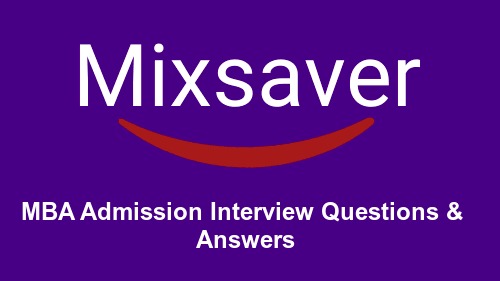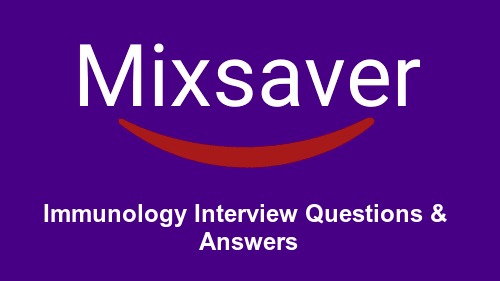1. Why did you decide to apply to our business school?
Answer this question in a similar fashion to why business school, but be sure it matches something specific in your personal and professional goals to something the school has. This is the most compelling reason you can provide a school to accept you other than your academic qualifications. The more unique and thought out your answer is, the better your application appears to an admission committee. This question is also not answered well by many students because they do not always give the impression that they have done their homework on the school they are interviewing with. Not being prepared on this question makes your interest in the programme pretty shallow.
2.What makes you stand out among other candidates?
Reveal to the interviewer something unique about yourself which can be a combination of experiences you have had (academic and professional) that would make you successful at their programme. Your unique experiences are of great interest to schools because they define who you are as a person, how you may contribute in the classroom, how employable you are, and how well you may perform academically.
3. What can you contribute to our programme?
Answer this question by relating to your strengths and experiences. If you have something very unique in your work experience be sure to mention it and how the school can value it. Also, don't be shy about how your experience can be of value to the classroom or to team members.
4. What are your expectations of this programme?
This is a question that should clearly demonstrate you have done your homework about the school and how its strengths will help you achieve your career expectations. If you want to go into real estate for example, be sure to answer in terms of how the programme's real estate courses will help you achieve your goals. Make sure you research the facts behind your answer or you may come across as not having done your homework.
5. How do you plan to use your degree?
This is similar to "Why business school?" You need to demonstrate how the degree can improve your chances in a career interest. Make sure your career interests were not researched the morning of the interview. You had better articulate a clear road map to getting where you want to go.
6. Why you decide to apply for this management institute?
Suggested answer : - to answer this question tell the interview panel that how the institute can help you in fulfilling your dream. Explain that the educational and overall standard of the institute is matching up with your skills and abilities.
7. What are your expectation from MBA programmers ?
Suggested Answer :- a) To get the business management knowledge b) To improve my self confidence. c) Improve my skills in corporate and business industry.
8. Where do you see yourself in the coming years?
Suggested Answer :- Using my resources and my learning to the flues. Either work in a good MNC or open my own venture. I want to apply my learning in my professional as well as my personnel life.
9. Who Should and Who Shouldn’t Interview?
If you think you’re a bad interviewer, stay home. Let your application do the talking for you. So it’s up to you. But if you feel comfortable meeting new people, then go for it. A lot of applicants have to meet new people daily as part of their jobs, so they get very good at interacting with strangers. Those people should always interview, as that can scientifically improve their admission chances.
10. Should I Interview with an Admissions Officer or an Alumnus?
It’s best to interview with someone on the admissions committee, but that isn’t always possible. You shouldn’t worry too much, though, if you end up having to interview with an alumnus or even a current student. That person will write up a report that will go into your file. Just try to get along with your interviewer.
11. A Few Recommendations on the Interview Arrangement
1. You have to know if you should ask for an interview or wait to be invited for one. If you have to ask for an interview before the application materials are received, then take care of that as soon as possible, even if you’re not certain that you will definitely apply to the school. It’s free and necessary, so just get it out of the way. I realized that the interview works both ways. Just as you’re selling yourself to the admissions officer, they’re trying to sell the school to you also. This may give a different perspective about the school that may change your mind about applying there, or encourage your decision to apply there.
2. If you’re going to try and arrange an interview with a popular school around an MBA fair, call early, because those slots fill up early.
3. Find out who is interviewing you and look up some background information for conversational fodder and insight into the interviewer’s perspective.
4. Practice the interview with someone who has ample interview experience. Although your answers may be correct, this will allow you to hone your body language, e.g. eye contact, posture, and minimal hand gestures. Also practice ad lib interview. You never know what the interviewer might ask. If you practice thinking on your feet, you will no doubt think better on your feet.
5. Whenever possible, interview with someone of the opposite sex.
6. Dress formally unless your interview is with an alumnus and the situation calls for casual clothes.
7. Relax! Don’t come off as stiff and overly formal. You want your interviewer to like you, so treat him or her like a friend.
8. Prepare your answers ahead of time.
9. Always plan to arrive 15 minutes early. Parking at some campuses can be difficult and most of the time you will need to obtain a parking pass and go back out to your car to place it in your window. (Usually the MBA program office can help validate and suggest parking locations.)
12. What are your expectations from an MBA program and the institute offering it?
This question asks you to share your expectations from the institute itself. You can mention a few of the most important points here. It is better to first say that you wish to obtain the best quality management education. Later you can say that the program syllable should cover all the essential aspects of management, improve your self confidence, acquire and develop business skills, and rather than giving only theoretical knowledge, the institute should impart practical corporate knowledge.
13. Why do you think we should enroll you in this institute?
You need to do self assessment to answer this question. It would allow you to think about your abilities, experience, and work energy. Since you already explain your academic record to the interviewer in your very first answer, you need not focus much upon it here. Do not forget to mention a few strong points of your personality. You can also say that your capability, interests, and skills would make you valuable from the company's point of view.
14. Why did you decide to apply for this program and in this management institute?
The answer to this question is supposed to be honest, but diplomatic. You can tell the interviewer that you have researched for your desired course program well enough and the management aspects that you want to master in are very well taught in the respective institute. You can also say that an MBA done through that institute would help you achieve your professional objectives. Explain that the standard and overall educational levels are matching up with your ability and skill sets.
15. Will you be able to accomplish your goals without an MBA?
Your answer to this question should convince the interviewer that you are desperately in need of an MBA degree so as to attain progress in your career. Tell the interviewer that you already possess the sense of management and administration, but you definitely need a master's degree and knowledge that would enhance your knowledge to become a successful business professional. It is advisable to say that you are passionate about management and you will need an MBA through a good institute to achieve your high goals in the corporate industry.





